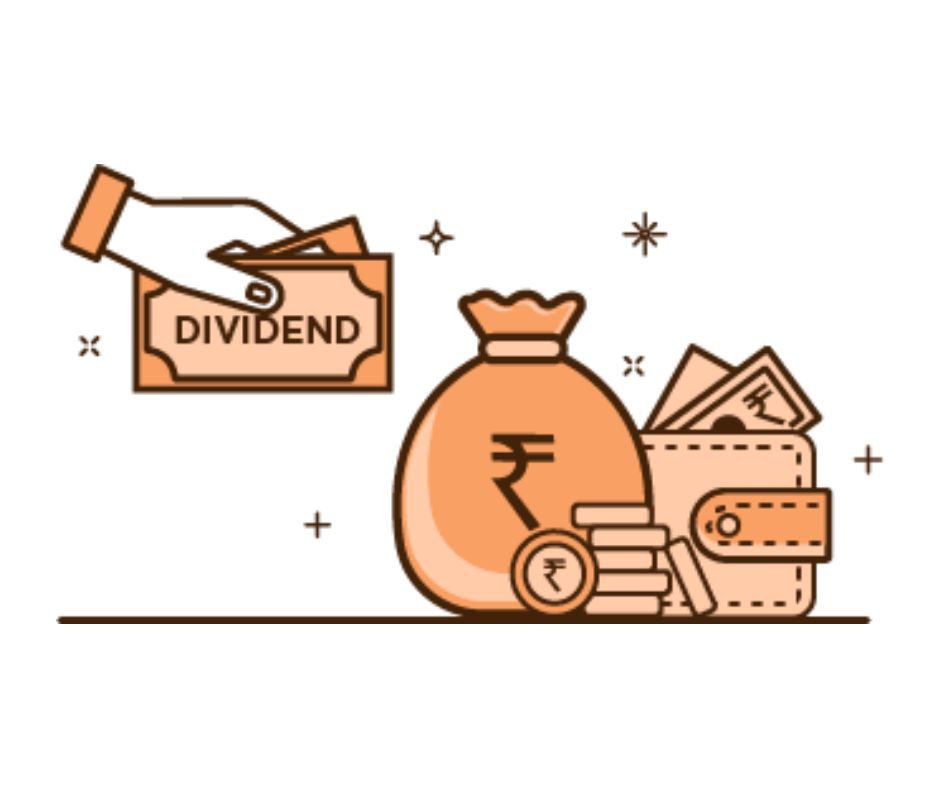![]()

What Are Dividends
If you’ve invested in stocks, you may have come across the term dividends. Understanding what dividends are and how they work can enhance your investment knowledge and help you make informed financial decisions. In this blog, we’ll explore what dividends are, how they’re paid, and what they mean for you as an investor.
What Are Dividends?
Dividends are payments that a corporation gives to its shareholders, typically as a way to share a portion of its profits. When a company earns a profit, it can choose to reinvest that money back into the business or share it with its shareholders in the form of dividends.
Key Characteristics of Dividends:
- Payment to Shareholders: Dividends are typically paid to shareholders on a per-share basis. This means that owning more shares will result in receiving a larger amount of dividends.
2. Types of Dividends: Dividend can come in various forms, including:
- Cash Dividends: The most common type, where payments are made in cash directly to shareholders.
- Stock Dividends: Additional shares are issued to shareholders instead of cash, increasing the number of shares they own.
- Special Dividends: One-time payments that are not part of the regular dividend schedule, often paid when a company has excess cash.
3. Regularity: Companies may pay dividend on a regular basis (e.g., quarterly, semi-annually, or annually) or as special one-time distributions.
4. Declaration and Payment: The company’s board of directors declares dividend and sets the payment date. There’s also a record date, which determines which shareholders are eligible to receive the dividend.
How Do You Receive Dividend?
If you own shares in a company that pays dividends, here’s how you typically receive them:
1.Eligibility: To qualify for dividend, you must own the shares before the ex-dividend date, which is the cutoff date set by the company. If you purchase the shares on or after this date, you won’t receive the upcoming dividend.
2.Declaration: Once the board of directors decides to pay a dividend, they announce the amount, the record date, and the payment date.
3.Payment: On the payment date, dividends are distributed to eligible shareholders. If you hold your shares in a brokerage account, the cash dividend will typically be credit directly to your account. If you hold physical stock certificates, you may receive a check in the mail.
Example of Receiving Dividends
Let’s say you own 100 shares of a company that has declared a dividend of $1 per share. Here’s how it works:
- Ex-Dividend Date: The company sets an ex-dividend date of March 1.
- Record Date: If you owned the shares before March 1, you qualify for the dividend.
- Payment Date: The company announces that dividends will be paid on March 15.
On March 15, you would receive $100 in cash (100 shares x $1 per share) credited to your brokerage account or as a check, depending on how you hold your shares.
Why Do Companies Pay Dividend?
Companies might decide to pay dividend for various reasons:
- Attract Investors: Regular dividend payments can make a company’s stock more attractive to investors seeking income, especially those looking for stable returns.
- Signal Financial Health: Paying dividend often indicates that a company is financially healthy and confident in its ongoing profitability.
- Reward Shareholders: Dividend serve as a way to reward shareholders for their investment and loyalty.
Conclusion
Dividend are a way for companies to share their profits with shareholders, providing a source of income and a signal of financial health. As an investor, understanding dividends and how they work can help you make informed decisions about your investments.
To visit https://www.mca.gov.in
FAQs
1. How do I receive dividend?
- You receive dividend as cash or additional shares, credited to your brokerage account or sent as a check.
2. When do I get dividend?
- Dividend are pay on a specific date call the payment date, after the company declares them.
3. What is the ex-dividend date?
- The ex-dividend date is the cutoff date. You must own shares before this date to receive the upcoming dividend.
4. What types of dividend are there?
- Common types include cash dividend (cash payments) and stock dividends (additional shares).
5. Why do companies pay dividend?
- Companies pay dividend to reward shareholders, attract investors, and show financial health.
6. Are dividends guarantee?
- No, dividend are not guarantee. Companies can change or stop dividends at any time.
7. How are dividend tax?
- Dividend are usually tax as income. The tax rate depends on your overall income and the type of dividend.
8. Can I reinvest dividend?
- Yes, many investors choose to reinvest dividend to buy more shares, which can increase their investment over time.
9. How can I find dividend-paying stocks?
- You can find dividend-paying stocks through financial news, stock screeners, or by researching companies known for paying dividends.

For further details access our website https://vibrantfinserv.com
